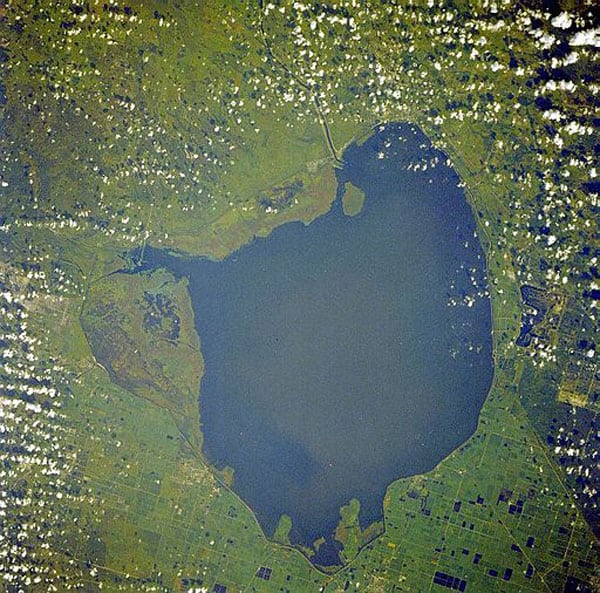
August 28, 2018, ClickOrlando and CNN
Something smells rotten in Florida. Guacamole-green and slimy, algae is taking over waterways, creating an economic and health crisis around Lake Okeechobee and the coast. It is toxic to breathe or touch. And it is becoming a venomous football between candidates as Election Day looms.
Beyond hurting Everglades tourism, Sachell Saunders in ClickOrlando notes that, “Blue-green algae blooms can cause humans to experience nausea, vomiting and even acute liver failure in severe cases if the affected water is ingested. Skin irritation, swollen lips, eye irritation, earaches and sore throats are other symptoms people can experience if they swim in water during a blue-green bloom.”
The state has been searching for ideas and people to address the problem as it gets worse. Although it has eased a bit in August, the cyanobacteria covered 90 percent of the lake in July. CNN reports,
“We really do have to get a handle on the nutrients that are driving these algae blooms because science has demonstrated that as our climates warm, we are going to see more algae blooms,” said Betty Staugler, a marine scientist with Florida Sea Grant. “We’re going to see more intense algae blooms and we’re going to see them in more places and so unless we want that for our future, we really need to take action today.”
Sign up for our free newsletters
Subscribe to NPQ's newsletters to have our top stories delivered directly to your inbox.
By signing up, you agree to our privacy policy and terms of use, and to receive messages from NPQ and our partners.
As is often the case, a nonprofit has stepped up. The Everglades Foundation began a search in 2016 for the most effective and efficient way to remove phosphorous from Florida waters. They proposed a significant prize: $10 million. Nine teams are now competing for the prize, down from 109. Four teams will be chosen to test their ideas and demonstrate the ability to scale it up to show it can be used globally.
Everglades Foundation, according to its mission, “advances scientifically sound and achievable solutions aimed at reversing environmental damage to this great ecosystem, from the Kissimmee River Watershed to the St. Lucie & Caloosahatchee Rivers and south to Florida Bay” After a slow start from 1995, the foundation has grown steadily since 2002, with revenue in 2016 of $10 million.
The foundation is making a huge commitment—their whole budget for one program, putting all its eggs in one basket to clean Lake Okeechobee and the surrounding waterways. The state has promised to contribute $1 million for the venture. They are hoping for tangible results by 2020.
“If we have that breakthrough, that technological breakthrough that makes this cost effective, this is a game changer,” CEO Erick Eickenberg said. “It’s going to have to produce a water quality standard that meets criteria that cleans up Lake Jessup, cleans up Lake Okeechobee, cleans up Lake Erie, and water bodies all across the nation.”
The foundation is betting a great deal that an answer can be found within a short amount of time that will remedy the problem throughout the region. They are placing that bet against pushback from elected officials who don’t acknowledge climate change and may lack the will to put in the effort. The foundation’s money and credibility is on the line; can a nonprofit philanthropy succeed where government has failed?—Marian Conway













